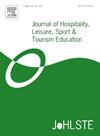娱乐管理专业学生的数字休闲使用与心理健康:社交媒体参与的中介作用
IF 4.1
2区 教育学
Q1 EDUCATION & EDUCATIONAL RESEARCH
Journal of Hospitality Leisure Sport & Tourism Education
Pub Date : 2025-07-23
DOI:10.1016/j.jhlste.2025.100570
引用次数: 0
摘要
本研究考察了娱乐管理专业的学生如何利用数字休闲时间及其对他们心理的影响。该研究旨在解释通过社交媒体参与数字休闲使用对学生心理健康的影响。本研究的理论模型是使用自我决定理论和使用方法建立的。满足感框架。采用定量研究方法,对三所不同大学的娱乐管理专业的学生进行了调查。对获得的387份可用调查数据进行了结构方程建模。结果显示,数字休闲使用对心理健康有积极影响。社交媒体参与在这一关系中具有不同的中介作用:发现情感社交媒体参与具有负向中介作用,而认知和行为社交媒体参与具有正向中介作用。因此,尽管数字休闲的使用基本上增强了心理健康,但社交媒体参与在这种关系中的作用各不相同。研究结果为旅游教育提供了重要的理论和实践见解和建议。它还为数字休闲空间中影响心理健康的因素以及社交媒体参与如何影响学生提供了更好的背景。本文章由计算机程序翻译,如有差异,请以英文原文为准。
Digital leisure use and psychological well-being among recreation management students: The mediating role of social media engagement
This study examines how recreation management students use digital leisure time and its impact on their psychology. The study aims to explain the effect of digital leisure use through social media engagement on students' psychological well-being. The theoretical model of the study was developed using Self-Determination Theory and the Uses & Gratifications framework. A survey was conducted among recreation management students at three different universities based on quantitative research methods. Structural equation modelling was applied to the 387 useable survey data obtained. According to the results, digital leisure use has a positive effect on psychological well-being. Social media engagement has a differential mediating effect in this relationship: affective social media engagement was found to mediate negatively, whereas cognitive and behavioural social media engagement mediated positively. Thus, although digital leisure use basically enhances psychological well-being, the role of social media engagement in this relationship varies. The results of this study provide important theoretical and practical insights and recommendations for tourism education. It also provides a better context for the factors that influence psychological well-being in the digital leisure space and how social media engagement can influence students.
求助全文
通过发布文献求助,成功后即可免费获取论文全文。
去求助
来源期刊
CiteScore
8.10
自引率
10.80%
发文量
41
审稿时长
42 days
期刊介绍:
The Journal of Hospitality, Leisure, Sport and Tourism Education (JoHLSTE) is the leading international, peer-reviewed educational journal for this subject grouping. Its aims are to: a) Promote, enhance and disseminate research, good practice and innovation in all aspects of higher education in Hospitality, Leisure, Sport and Tourism and Events to its prime audience including teachers, researchers, employers, and policy makers. b) Encourage greater understanding, links and collaboration across its constituent fields. JoHLSTE is designed to have maximum impact through it being available on-line, fully archived and peer-reviewed. JoHLSTE is divided into seven sections: Editorial; Academic Papers; Practice Papers, Perspectives, Comments and Rejoinders, Research Notes and Reports and Education Resource Reviews.

 求助内容:
求助内容: 应助结果提醒方式:
应助结果提醒方式:


